
"Marlbrough s'en va-t-en guerre" or "Malbrook s'en va-t-en guerre" ("Marlborough Has Left for the War" also known as "Mort et convoi de l'invincible Malbrough", "The Death and Burial of the Invincible Marlbrough") is a popular folk song in French.

"Marlbrough s'en va-t-en guerre" or "Malbrook s'en va-t-en guerre" ("Marlborough Has Left for the War" also known as "Mort et convoi de l'invincible Malbrough", "The Death and Burial of the Invincible Marlbrough") is a popular folk song in French.
The burlesque lament on the death of John Churchill, 1st Duke of Marlborough (1650–1722) was written on a false rumour of that event after the Battle of Malplaquet in 1709, the bloodiest battle of the War of the Spanish Succession. It tells how Marlborough's wife, awaiting his return from battle, is given the news of her husband's death. It also tells that he was buried and that a nightingale sang over his grave.
For years it was only known traditionally, and does not appear among the many anecdotic songs printed in France during the middle of the 18th century. Beaumarchais used the tune in his 1778 play The Marriage of Figaro for a despairing love song for Cherubino. [1] [2] In 1780 it became very popular. For instance, the tune concludes a sonata (in D-major) for viola d'amore and viola composed by Carl Stamitz in 1780 while in Paris. And it happened that when Louis XVII of France was born in 1785 (son of Louis XVI and Marie Antoinette and heir to the French throne) he was wet-nursed by a peasant named Geneviève Poitrine. The nurse, whilst rocking the royal cradle, sang "Marlborough s'en va-t-en guerre". The name, the simplicity of the words, and the melodiousness of the tune, interested the queen, and she frequently sang it. Everybody repeated it after her, including the king. The song was sung in the state apartments of Versailles, in the kitchens and in the stables – it became immensely popular. [3] [4]
From the court it was adopted by the tradespeople of Paris, and it passed from town to town, and country to country. It became as popular in England as in France. Johann von Goethe came to hate Marlborough simply on account of the prevalence of the tune he encountered during travels in France. [5] It also became popular in Spain due to the Bourbon dynasty's influence on Spanish nobility. The name of Marlborough was modified to an easier to pronounce Mambrú. It was sung by children while playing Hopscotch (Rayuela). The Spanish guitarist and composer Fernando Sor (1778–1839) created a series of variations for guitar on the theme. It then spread to Latin America.
The rage endured for many years, slowly fading after the French Revolution, although, it is said that Napoleon liked to hum the tune, for instance when crossing the Memel (June 1812) at the beginning of his fatal Russian campaign.[ citation needed ]
The melody also became widely popular in the United Kingdom. [6] By the mid-19th century [7] it was being sung with the words "For He's a Jolly Good Fellow", often at all-male social gatherings. [8] By 1862, it was already familiar in America. [9]
The song has been translated into several languages, including an English version published by the American poet Henry Wadsworth Longfellow in the 19th century. [10]

Marlbrough s'en va-t-en guerre,
mironton, mironton, mirontaine,
Marlbrough s'en va-t-en guerre,
Ne sait quand reviendra.
Il reviendra-z-à Pâques,
mironton, mironton, mirontaine,
Il reviendra-z-à Pâques,
ou à la Trinité.
La Trinité se passe,
mironton, mironton, mirontaine,
la Trinité se passe,
Marlbrough ne revient pas.
Madame à sa tour monte,
mironton, mironton, mirontaine,
Madame à sa tour monte
si haut qu'elle peut monter.
Elle voit venir son page,
mironton, mironton, mirontaine,
elle voit venir son page,
tout de noir habillé.
Beau page, mon beau page,
mironton, mironton, mirontaine,
beau page, mon beau page,
quelles nouvelles apportez?
Aux nouvelles que j'apporte,
mironton, mironton, mirontaine,
aux nouvelles que j'apporte,
vos beaux yeux vont pleurer!
Quittez vos habits roses,
mironton, mironton, mirontaine,
quittez vos habits roses,
et vos satins brodés!
Monsieur Marlbrough est mort.
mironton, mironton, mirontaine,
Monsieur Marlbrough est mort.
Est mort et enterré.
Je l'ai vu porter en terre,
mironton, mironton, mirontaine,
Je l'ai vu porter en terre,
par quatre-z-officiers.
L'un portait sa cuirasse
mironton, mironton, mirontaine,
l'un portait sa cuirasse
l'autre son bouclier.
L'autre portait son grand sabre,
mironton, mironton, mirontaine,
L'autre portait son grand sabre,
et l'autre ne portait rien.
On planta sur sa tombe
mironton, mironton, mirontaine,
on planta sur sa tombe
un beau rosier fleuri.
La cérémonie faite,
mironton, mironton, mirontaine,
la cérémonie faite
chacun s'en fut coucher.
Alors autour de sa tombe
Mironton, mironton, mirontaine
Alors autour de sa tombe
Romarins l'on planta.
Sur la plus haute branche
Un rossignol chanta
On vit voler son âme,
Au travers des lauriers.
Chacun mit ventre à terre,
Mironton, mironton, mirontaine
Chacun mit ventre à terre,
Et puis se releva.
Marlbrook the Prince of Commanders
Is gone to war in Flanders,
His fame is like Alexander's,
But when will he ever come home?
Mironton, mironton, mirontaine.
Perhaps at Trinity Feast, or
Perhaps he may come at Easter,
Egad! he had better make haste or
We fear he may never come home.
Mironton etc.
For Trinity Feast is over,
And has brought no news from Dover,
And Easter is pass'd moreover,
And Malbrook still delays.
Milady in her watch-tower
Spends many a pensive hour,
Not knowing why or how her
Dear lord from England stays.
While sitting quite forlorn in
That tower, she spies returning
A page clad in deep mourning,
With fainting steps and slow.
"O page, prithee come faster!
What news do you bring of your master?
I fear there is some disaster,
Your looks are so full of woe."
"The news I bring fair lady,"
With sorrowful accent said he,
"Is one you are not ready
So soon, alas! to hear.
"But since to speak I'm hurried,"
Added this page, quite flurried,
"Malbrook is dead and buried!"
And here he shed a tear.
"He's dead! He's dead as a herring!
For I beheld his berring,
And four officers transferring
His corpse away from the field.
"One officer carried his sabre,
And he carried it not without labour,
Much envying his next neighbour,
Who only bore a shield.
"The third was helmet bearer –
That helmet which in its wearer
Fill'd all who saw it with terror,
And cover'd a hero's brains.
"Now, having got so far, I
Find that – by the Lord Harry!
The fourth is left nothing to carry.
So there the thing remains."
Mironton, mironton, mirontaine.[ citation needed ]
The song is one of several contemporary tunes that are played by the musical box of the Negress head clock, made in Paris in 1784. Rita Dove references the song and the clock in her 2009 poem "Ode on a Negress Head Clock, with Eight Tunes". [11]
Ludwig van Beethoven used the tune in his musical work Wellington's Victory , which, like Tchaikovsky's later 1812 Overture , features real cannon shots.
Goethe references the song in the "Zweite Elegie" of his Roman Elegies (1786–1788). [12] Heinrich Heine then mentions Goethe's reference in his "Zweiter Brief aus Berlin" (16 March 1822) as example of a catchy tune. [13]
The song is referenced in Nikolai Gogol's 1842 novel Dead Souls , when Major Nozdryov's playing of the mazurka devolves into the common tune in chapter 4.[ citation needed ]
The song is referenced in Fyodor Dostoevsky's 1866 novel Crime and Punishment , where Katerina Ivanovna Marmeladova tries to make her children sing the popular Russian version in public shortly before her death.[ citation needed ]
An operetta titled Marlbrough s'en va-t-en guerre was produced in Paris in December 1867 with Suzanne Lagier. One act each was written by Georges Bizet, Léo Delibes, Émile Jonas and isidore Legouix (see Classical music written in collaboration).
The song is referenced in Leo Tolstoy's 1869 novel War and Peace , where Prince Nikolai Bolkonsky sings the last two lines of the first verse of the song to his son Prince Andrei after hearing Russia's military strategy (Part One, chapter XXIII). [14]
The song is referenced in Vladimir Nabokov's 1969 novel Ada or Ardor: A Family Chronicle , in chapter 40; Blanche hums it while Lucette and Ada, observed by Van, practice drawing flowers in one of the nursery parlors.[ citation needed ]
The song is referenced in Patrick O'Brian's 1979 novel The Fortune of War in chapter 8 when Captain Jack Aubrey hears it being sung by French soldiers in a bar in a hotel from which Aubrey helps Stephen Maturin and Diana Villiers escape.[ citation needed ]
| Wikisource has original text related to this article: |

Gilles Vigneault is a Québécois poet, publisher, singer-songwriter, and Quebec nationalist and sovereigntist. Two of his songs are considered by many to be Quebec's unofficial anthems: "Mon pays" and "Gens du pays", and his line Mon pays ce n'est pas un pays, c'est l'hiver became a proverb in Quebec. Vigneault is a Grand Officer of the National Order of Quebec, Knight of the Legion of Honour, and Officer of the Ordre des Arts et des Lettres.

Claude Barruck Joseph Lelouch is a French film director, writer, cinematographer, actor and producer.

"Warszawianka 1831 roku", "La Varsovienne" is a Polish patriotic song written by Casimir François Delavigne with music by Karol Kurpiński.
Beau Dommage was a rock band from Montreal, Quebec, who achieved success in Quebec and France in the 1970s. The group's style included rich vocal harmonies and elements borrowed from folk and country music.

Salvatore Adamo is a singer and composer, who is known for his romantic ballads. Adamo was born in Comiso, Sicily, Italy, and has lived in Belgium since the age of three, which is why he has dual citizenship.

"Le bon roi Dagobert", also called "Le roi Dagobert a mis sa culotte à l’envers", is an old French song featuring King Dagobert and Saint Eligius, two historical people. The song was created in the 1750s and was intended to ridicule royalty. It was inspired by tales of debauchery of the life of Dagobert I.
Robert Goldman is a French songwriter. He was born in Paris, the son of Alter Mojze Goldman and Ruth Ambrunn who were Jewish Resistance fighters during the Second World War. He is the younger brother of Jean-Jacques Goldman and half-brother of Pierre Goldman.

André Fontaine was a French historian and journalist. He started working at Temps Présent, and then was director at Le Monde in 1947, at the official beginning of the Cold War. He became the newspaper's editor from 1969 to 1985, and director from 1985 to 1991. As of February 2007 he was still contributing articles to the paper. André Fontaine is famous for his historical thesis according to which the Cold War in fact started as soon as 1917 with the cordon sanitaire policy.
The César Award for Most Promising Actor is one of the César Awards, presented annually by the Académie des Arts et Techniques du Cinéma to recognize the outstanding breakthrough performance of a young actor who has worked within the French film industry during the year preceding the ceremony. Nominees and winner are selected via a run-off voting by all the members of the Académie, within a group of 16 actors previously shortlisted by the Révélations Committee.

Jules Roy was a French writer. "Prolific and polemical" Roy, born an Algerian pied noir and sent to a Roman Catholic seminary, used his experiences in the French colony and during his service in the Royal Air Force during the Second World War as inspiration for a number of his works. He began writing in 1946, while still serving in the military, and continued to publish fiction and historical works after his resignation in 1953 in protest of the First Indochina War. He was an outspoken critic of French colonialism and the Algerian War of Independence and later civil war, as well as a strongly religious man.

Gaston Mardochée Brunswick, better known by his pseudonym Montéhus, was a French singer-songwriter. He was the writer of such notable songs as "Gloire au 17ème" and "La Butte Rouge".
Jean Vautrin, real name Jean Herman, was a French writer, filmmaker and film critic.
Amédée Fengarol was a Guadeloupean politician. He died in the street on the day of his election as communist mayor of Pointe-à-Pitre. The cause of death was contested, the communist party and the newspaper L'Étincelle continued for years to maintain he was assassinated, yet other witnesses confirm no trace of blood on his shirt and that he may have died of natural causes. In either case the accusation of foul play continued to destabilise the socialist government of Paul Valentino who had succeeded in getting himself reelected as mayor.
La Parisienne is a famous song by Casimir Delavigne. It was composed after the July Revolution and in homage to it, and served as the French national anthem during the July Monarchy (1830-1848).

Henri Marie Gabriel Blondeau was a French playwright, librettist and chansonnier, famous for his song Frou-frou.
Charles Derennes was a French novelist, essayist and poet, the winner of the Prix Femina in 1924.

Geneviève Poitrine, known as Madame Poitrine, was a wet nurse of the Dauphin of France, Louis Joseph, son of King Louis XVI and Queen Marie Antoinette. Poitrine was retrospectively accused of transmitting tuberculosis to the infant prince, thus inadvertently causing his death, aged seven years; this meant that his younger brother Louis Charles became heir apparent. The word poitrine translates to "chest" or "bosom", and her married name of Madame Poitrine was remarked upon by contemporaries as being appropriate for her duties.

Michel Rivard is a singer-songwriter and musician from Quebec. He was born in Montreal, Quebec, Canada. His father Robert Rivard was an actor. Michel began his career at an early age appearing in a Canadian television series and in TV commercials.
Jean-Pierre Vincent was a French theatrical actor and director.

The Negress head clock is a type of French Empire mantel clock depicting the head of a black woman flanked by sculptured putti. It is considered among the eccentricities of French horology and had drawn attention during the late eighteenth century. Five examples are noted in prominent collections.